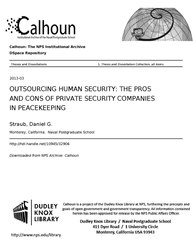File:OUTSOURCING HUMAN SECURITY- THE PROS AND CONS OF PRIVATE SECURITY COMPANIES IN PEACEKEEPING (IA outsourcinghuman1094532906).pdf

Original file (1,275 × 1,650 pixels, file size: 1.67 MB, MIME type: application/pdf, 394 pages)
| This is a file from the Wikimedia Commons. Information from its description page there is shown below. Commons is a freely licensed media file repository. You can help. |
Summary
| OUTSOURCING HUMAN SECURITY: THE PROS AND CONS OF PRIVATE SECURITY COMPANIES IN PEACEKEEPING
( |
||
|---|---|---|
| Author |
Straub, Daniel G. |
|
| Title |
OUTSOURCING HUMAN SECURITY: THE PROS AND CONS OF PRIVATE SECURITY COMPANIES IN PEACEKEEPING |
|
| Publisher |
Monterey, California. Naval Postgraduate School |
|
| Description |
The United Nations is an international organization that acts in world affairs with the proclaimed aim of ending the scourge of war and promoting world peace. The UN often uses peacekeeping to further this goal. This dissertation considers the potential for private security companies (PSCs) to make a contribution to peacekeeping missions. PSCs claim to offer a flexible capability that can be used to assist organizations and states toward improvements in human security. PSCs offer services ranging in scope from protecting diplomats to providing security for major corporations, NGOs, and the UN. They also claim that their services can be performed better, cheaper, and faster than states or organizations like the UN. For example, supporters of PSCs claim that they could have prevented atrocities such as occurred in Rwanda, Srebrenica, and Congo. Opponents of the increased use of PSCs raise a host of concerns, including cost, morality, legitimacy, loyalty, fraud, accountability, and political will. In an era when states often lack critical capabilities to protect the peace or prevent war, PSCs may offer a temporary solution to fill these gaps. What are the advantages and disadvantages to the use of PSCs for international peacekeeping The analysis in this dissertation focuses on the ability of PSCs to perform not just specific tasks, but on their ability to conduct of peacekeeping with legitimacy, accountability, and impartiality, while protecting human security. Since ending the scourge of war is the most important goal of the UN, then human security must be the guiding principle upon which all structures of integration, communication, and interrelationships in peacekeeping are based. Using the concept of human security as a guiding principle, this dissertation evaluates the pros and cons of the use of PSCs in peacekeeping and finds that PSCs should be used in peacekeeping operations as a hybridized force where their demonstrated strengths, generally speed and flexibility, are used to maximize effectiveness of instituting UN Security Council-mandated peacekeeping. Subjects: Private Security Company Private Military Company Private Military and Security Company Military Service Provider Armed Security Company Armed Humanitarians Peacekeeper Peacekeeping Operations United Nations Peacekeeping Sierra Leone Bosnia Angola Responsibility to Protect R2P Pros and Cons Human Security Mercenary Mercenaries United Nations Protection of Civilians |
|
| Language | English | |
| Publication date | March 2013 | |
| Current location |
IA Collections: navalpostgraduateschoollibrary; fedlink |
|
| Accession number |
outsourcinghuman1094532906 |
|
| Source | ||
| Permission (Reusing this file) |
Approved for public release; distribution is unlimited | |
Licensing
| Public domainPublic domainfalsefalse |
This work is in the public domain in the United States because it is a work prepared by an officer or employee of the United States Government as part of that person’s official duties under the terms of Title 17, Chapter 1, Section 105 of the US Code.
Note: This only applies to original works of the Federal Government and not to the work of any individual U.S. state, territory, commonwealth, county, municipality, or any other subdivision. This template also does not apply to postage stamp designs published by the United States Postal Service since 1978. (See § 313.6(C)(1) of Compendium of U.S. Copyright Office Practices). It also does not apply to certain US coins; see The US Mint Terms of Use.
|
 | |
| This file has been identified as being free of known restrictions under copyright law, including all related and neighboring rights. | ||
https://creativecommons.org/publicdomain/mark/1.0/PDMCreative Commons Public Domain Mark 1.0falsefalse
Captions
Items portrayed in this file
depicts
File history
Click on a date/time to view the file as it appeared at that time.
| Date/Time | Thumbnail | Dimensions | User | Comment | |
|---|---|---|---|---|---|
| current | 16:10, 23 July 2020 |  | 1,275 × 1,650, 394 pages (1.67 MB) | Fæ | FEDLINK - United States Federal Collection outsourcinghuman1094532906 (User talk:Fæ/IA books#Fork8) (batch 1993-2020 #24302) |
File usage
Metadata
This file contains additional information, probably added from the digital camera or scanner used to create or digitize it.
If the file has been modified from its original state, some details may not fully reflect the modified file.
| Short title | OUTSOURCING HUMAN SECURITY: THE PROS AND CONS OF PRIVATE SECURITY COMPANIES IN PEACEKEEPING |
|---|---|
| Author | Straub, Daniel G. |
| Software used | Straub, Daniel G. |
| Conversion program | Acrobat Distiller 10.1.5 (Windows) |
| Encrypted | no |
| Page size | 612 x 792 pts (letter) |
| Version of PDF format | 1.4 |


